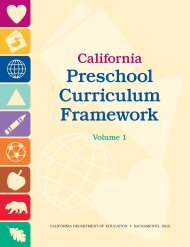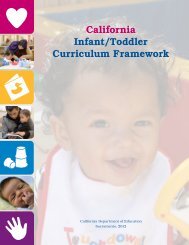California Preschool Learning Foundations - ECEZero2Three ...
California Preschool Learning Foundations - ECEZero2Three ...
California Preschool Learning Foundations - ECEZero2Three ...
You also want an ePaper? Increase the reach of your titles
YUMPU automatically turns print PDFs into web optimized ePapers that Google loves.
SOCIAL-EMOTIONAL DEVELOPMENT<br />
14 | Social Interaction<br />
3.0 Group Participation<br />
At around 48 months of age At around 60 months of age<br />
3.1 Participate in group activities and<br />
are beginning to understand and<br />
cooperate with social expectations,<br />
group rules, and roles.<br />
Children enjoy participating in group activities<br />
and are beginning to understand social expectations<br />
and group rules and their application.<br />
Children may have difficulty, however, coordinating<br />
their interests with those of the group.<br />
Examples Examples<br />
• Enjoys playing simple games, such as<br />
“Duck-Duck-Goose” or “Follow the Leader,”<br />
with adult help.<br />
• Stays with the group for a nature walk.<br />
• Notices when other children are missing from<br />
class.<br />
• Responds appropriately when a teacher<br />
announces circle time or cleanup, although<br />
may need guidance in what to do.<br />
• Is interested in playing games but often deviates<br />
from the rules.<br />
• Attention often wanders after a brief period of<br />
group activity, especially if it is not personally<br />
engaging, which may result in inappropriate<br />
behavior or nonparticipation.<br />
• Begins to explore social roles (e.g., mother,<br />
teacher) in pretend play.<br />
• Responds appropriately to verbal prompts in<br />
songs or stories during circle time (e.g., “Hokey<br />
Pokey,” “Head, Shoulders, Knees, and Toes,”<br />
“Itsy Bitsy Spider”).<br />
• Needs help remembering how to prepare for an<br />
activity, such as getting ready to paint at an easel.<br />
• With adult prompting, can share toys or wait<br />
for a turn.<br />
3.1 Participate positively and cooperatively<br />
as group members.<br />
Children participate in group activities with<br />
the ability to anticipate familiar routines and<br />
contribute to shared projects more competently<br />
as group members.<br />
• Anticipates the predictable routines of the day,<br />
such as initiating hand washing without being<br />
prompted when snack time arrives.<br />
• Actively explores social roles in imaginative play.<br />
• Is more capable of sustained attention and<br />
remaining engaged in group activities, such as<br />
putting a puzzle together cooperatively.<br />
• Applies game rules more consistently for simple<br />
games.<br />
• Knows the procedure for leaving the setting to<br />
go to the bathroom or to another room and<br />
corrects children who do not follow the<br />
procedure.<br />
• Anticipates and begins preparing for an activity,<br />
such as a painting project.<br />
• Sometimes shares spontaneously and thinks<br />
of turn-taking without adult prompting.<br />
<strong>Preschool</strong> <strong>Learning</strong> <strong>Foundations</strong>, Volume 1 • <strong>California</strong> Department of Education
















